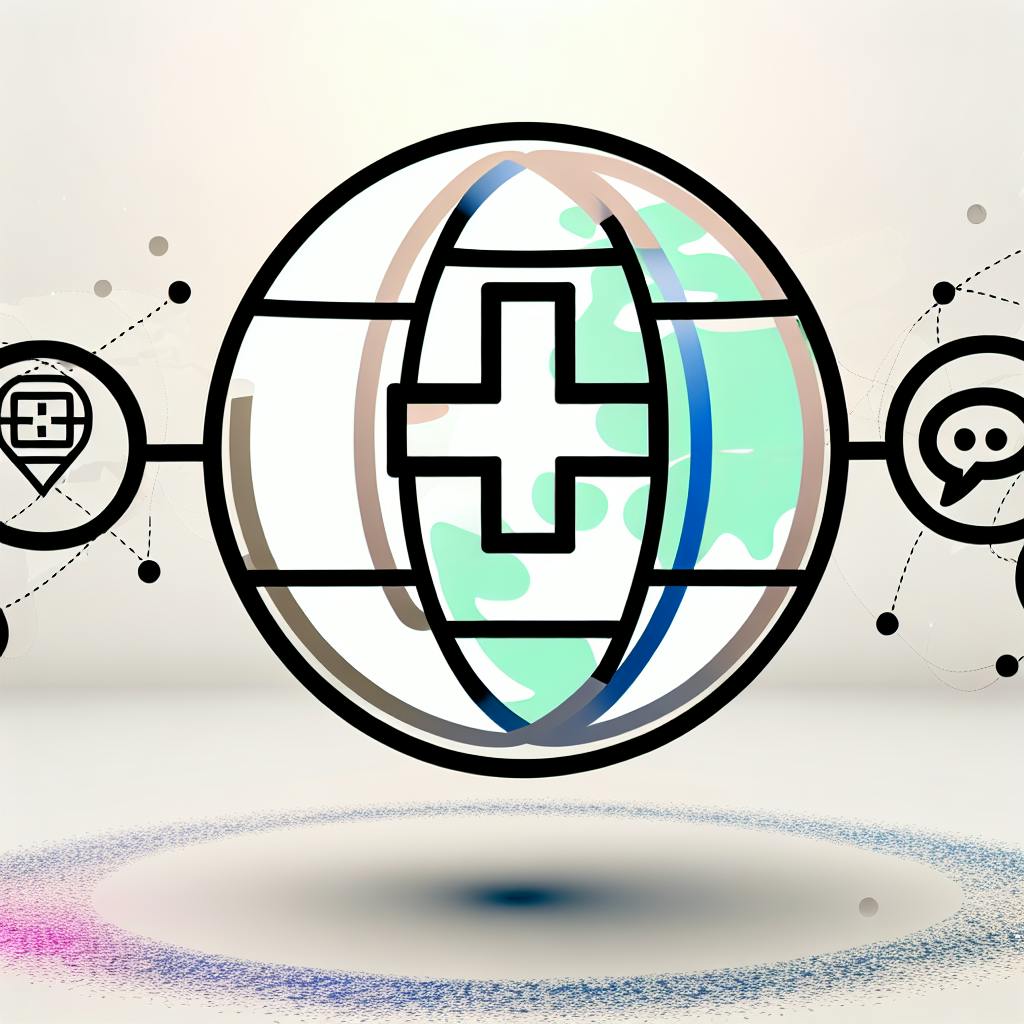AI scribe software uses natural language processing and machine learning to automatically transcribe and generate notes from therapy sessions. This allows therapists to focus on patient care while ensuring accurate documentation.
Key Benefits:
- Saves time by automating note-taking
- Improves accuracy and consistency of documentation
- Enables data analysis to track patient progress
- Streamlines workflows and reduces administrative burdens
How It Works:
- Transcribes conversations in real-time
- Analyzes transcripts to identify key themes
- Generates comprehensive session notes
- Integrates with EHR systems for easy access
Top AI Scribe Software in 2024:
| Software | Key Features |
|---|---|
| mdhub | Speech recognition, customizable templates, EHR integration |
| Mentalyc | Automated notes, HIPAA compliance, high accuracy |
| Blueprint | Privacy-first approach, streamlined documentation |
| Upheal | Multilingual support, EHR/telehealth integration |
| AutoNotes | Customizable templates, competitive pricing |
| TheraPro | Secure data protocols, flexible pricing plans |
| Orchid AI | EHR integration, high accuracy, data security |
By automating documentation, AI scribe software enables therapists to provide better patient care while ensuring compliance and data security.
What is AI Scribe Software?
AI scribe software is a technology designed to improve the way behavioral health professionals document therapy sessions. This innovative tool uses artificial intelligence (AI) and natural language processing (NLP) to automate the note-taking process, freeing up clinicians to focus on patient care.
How AI Scribe Software Works
AI scribe software listens to and transcribes therapy sessions in real-time. The AI algorithm then analyzes the transcription, identifying key themes and insights to generate accurate notes.
Key Features of AI Scribe Software
| Feature | Description |
|---|---|
| Speech Recognition | Accurately transcribes spoken words into written text |
| Natural Language Processing | Analyzes and interprets the meaning of the conversation |
| Note Generation | Creates comprehensive and structured notes based on the analysis |
| Customizable Templates | Allows clinicians to tailor notes to their specific needs and preferences |
| Integration with EHR Systems | Seamlessly integrates with electronic health record (EHR) systems for easy access and management of patient data |
By using AI scribe software, behavioral health professionals can streamline their documentation process, reduce administrative burdens, and focus on delivering high-quality patient care.
AI Scribes vs. Traditional Note-Taking
Drawbacks of Manual Note-Taking
Manual documentation in behavioral health has several limitations. It can be time-consuming, taking away from the time clinicians can spend with patients. Handwritten notes can be illegible or incomplete, leading to errors. Moreover, manual note-taking can disrupt the clinician-patient interaction, as the clinician may need to focus on writing notes instead of engaging with the patient.
Benefits of AI Scribe Software
AI scribe software offers several advantages. It can automate the note-taking process, freeing up clinicians to focus on patient care. AI scribe software can also improve documentation accuracy, reduce errors, and enhance confidentiality of patient-clinician communications. Additionally, AI scribe software can save time, reduce administrative burdens, and improve the overall quality of care.
Comparison: Traditional vs. AI Scribe
| Feature | Traditional Note-Taking | AI Scribe Software |
|---|---|---|
| Accuracy | Prone to errors | High accuracy |
| Time | Time-consuming | Saves time |
| Efficiency | Manual | Automated |
| Confidentiality | Risk of breach | Enhanced confidentiality |
| Cost | High costs | Cost-effective |
| Compliance | Risk of non-compliance | Ensures compliance |
By using AI scribe software, behavioral health professionals can streamline their documentation process, reduce administrative burdens, and focus on delivering high-quality patient care.
Top AI Scribe Software in 2024
The AI scribe software market has seen significant growth in recent years, with numerous solutions emerging to cater to the needs of behavioral health professionals. In this section, we will explore the top AI scribe software in 2024, highlighting their key features, security measures, and user experiences.
mdhub: For Therapy Practices
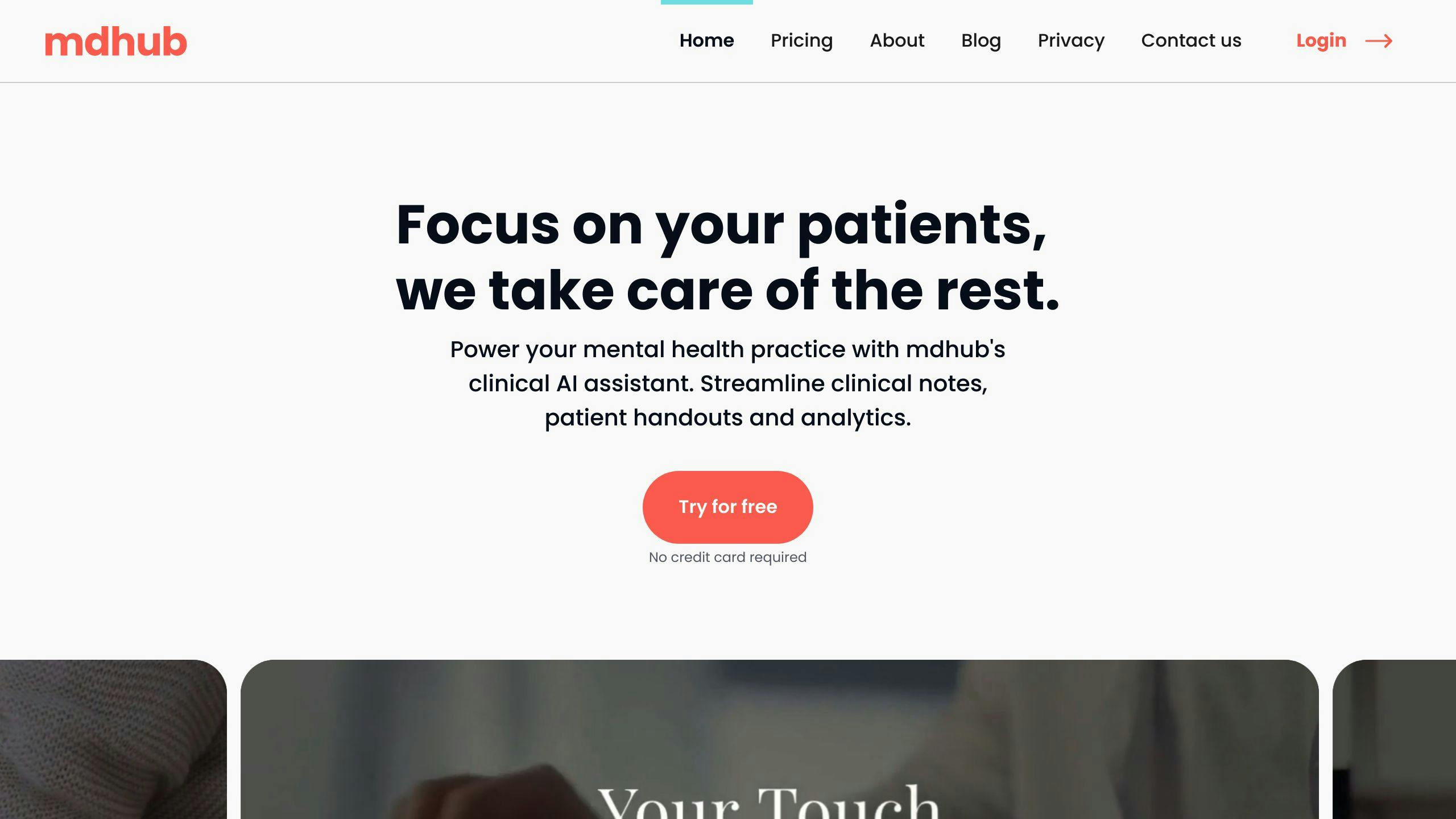
mdhub is a popular AI scribe software designed specifically for therapy practices. It seamlessly integrates with existing workflows, allowing clinicians to focus on patient care while automating note-taking tasks. mdhub's user-friendly interface and customizable templates enable therapists to create detailed patient notes with ease.
Key Features
- Speech recognition and natural language processing
- Customizable templates for note-taking
- Integration with EHR systems
- High accuracy and efficiency
Mentalyc: Automated Therapy Notes
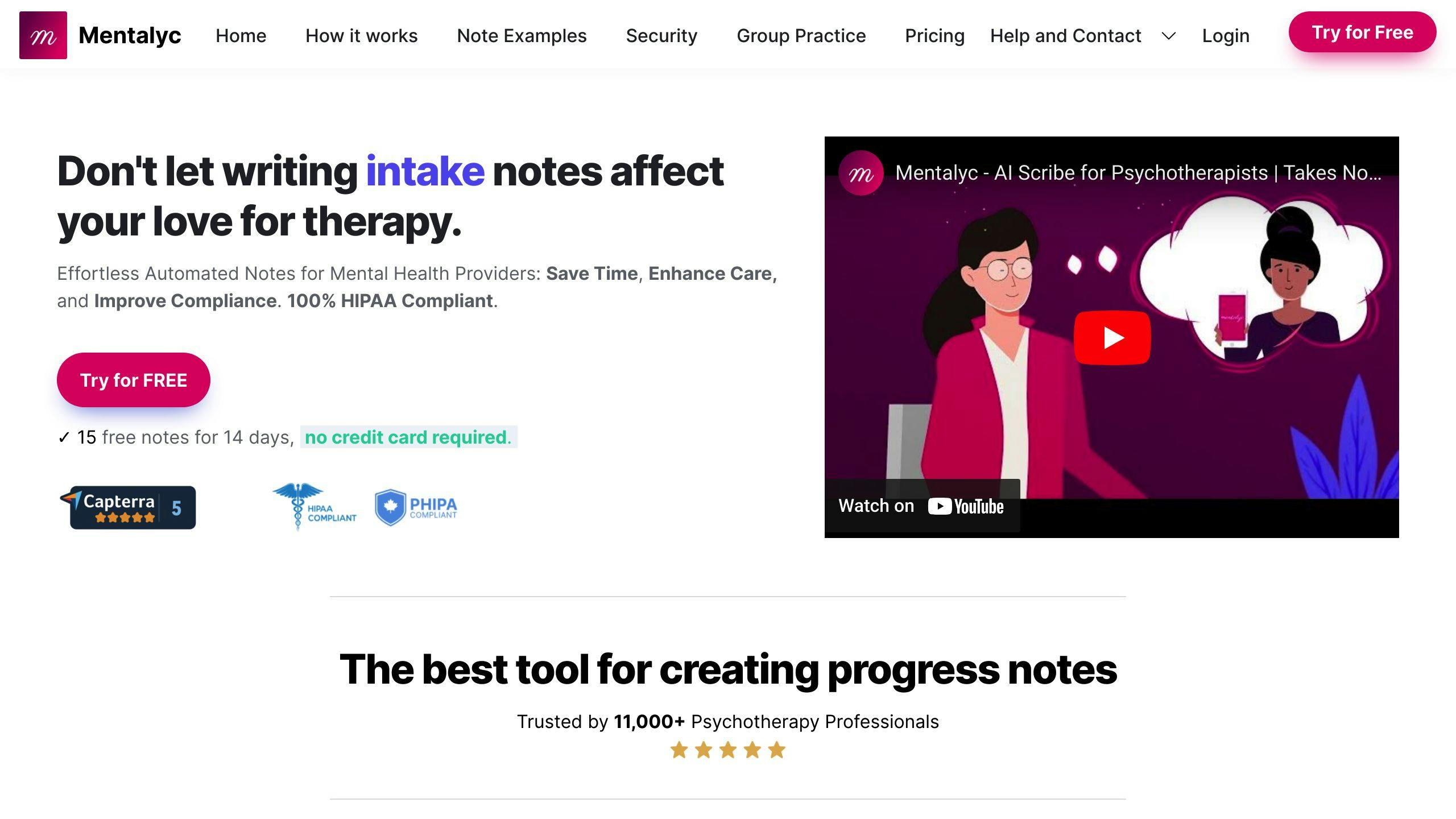
Mentalyc is an AI-powered scribe software that automates therapy notes with high accuracy and efficiency. It complies with multiple regulations, including HIPAA, and ensures the security and confidentiality of patient data.
Key Features
- Automated note-taking with high accuracy
- Compliance with HIPAA and other regulations
- User feedback highlights significant productivity enhancements
Mentalyc: AI vs. Human Scribes
| Feature | AI Scribe | Human Scribe |
|---|---|---|
| Accuracy | High | Variable |
| Cost | Lower | Higher |
| Efficiency | Faster | Slower |
Blueprint: AI Notes for Therapists
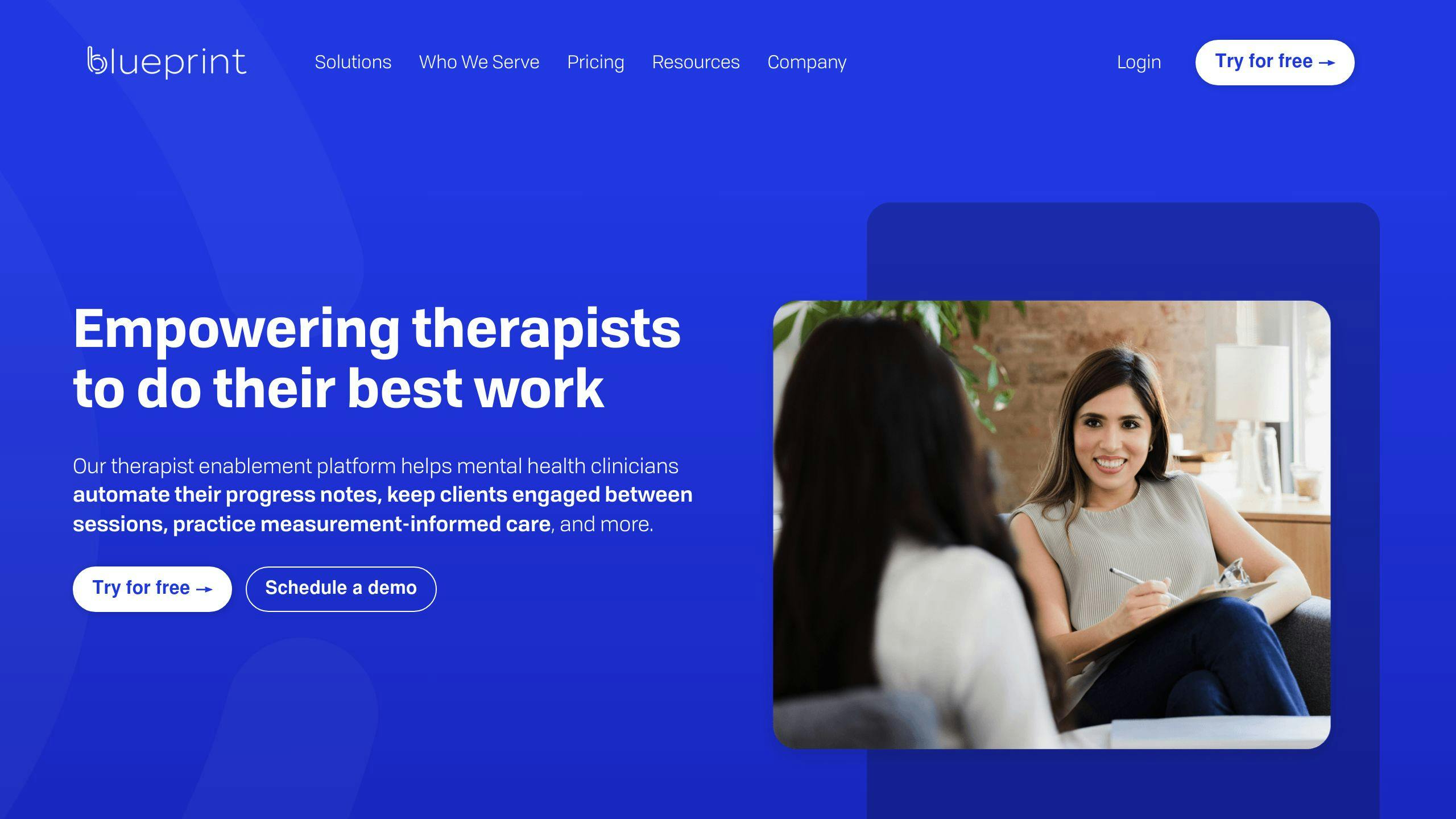
Blueprint is a cutting-edge AI notetaking software designed for therapists. Its privacy-first approach ensures the security and confidentiality of patient data.
Key Features
- AI-powered note-taking with high accuracy
- Privacy-first approach for patient data
- User testimonials highlight streamlined documentation processes
Upheal: Multilingual Therapy Notes
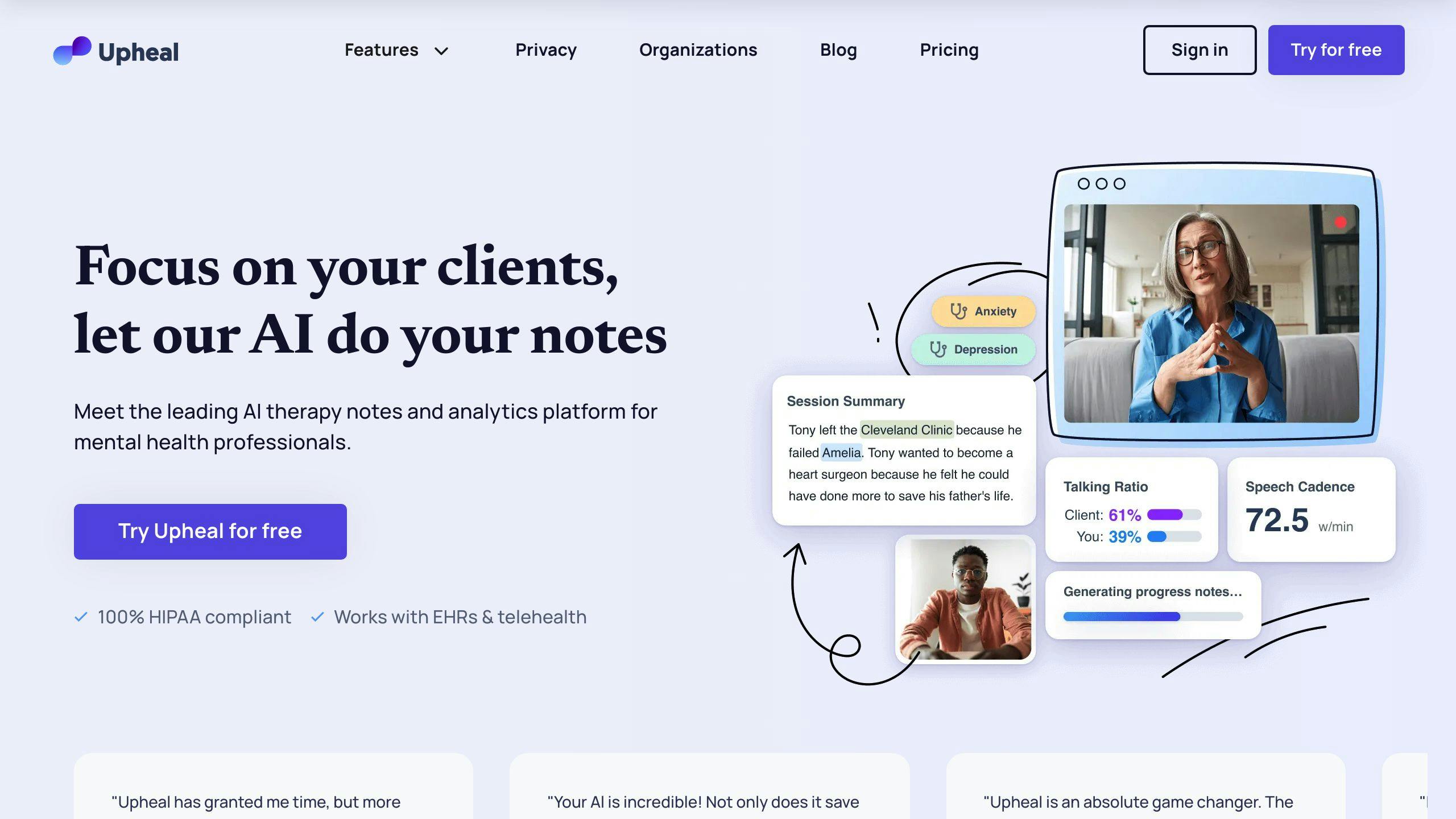
Upheal is a unique AI scribe software that offers multilingual support for session documentation. It seamlessly integrates with EHRs and telehealth platforms, making it an attractive option for therapy practices with diverse patient populations.
Key Features
- Multilingual support for session documentation
- Integration with EHRs and telehealth platforms
- Accurate and efficient note-taking
AutoNotes: Customizable Progress Notes
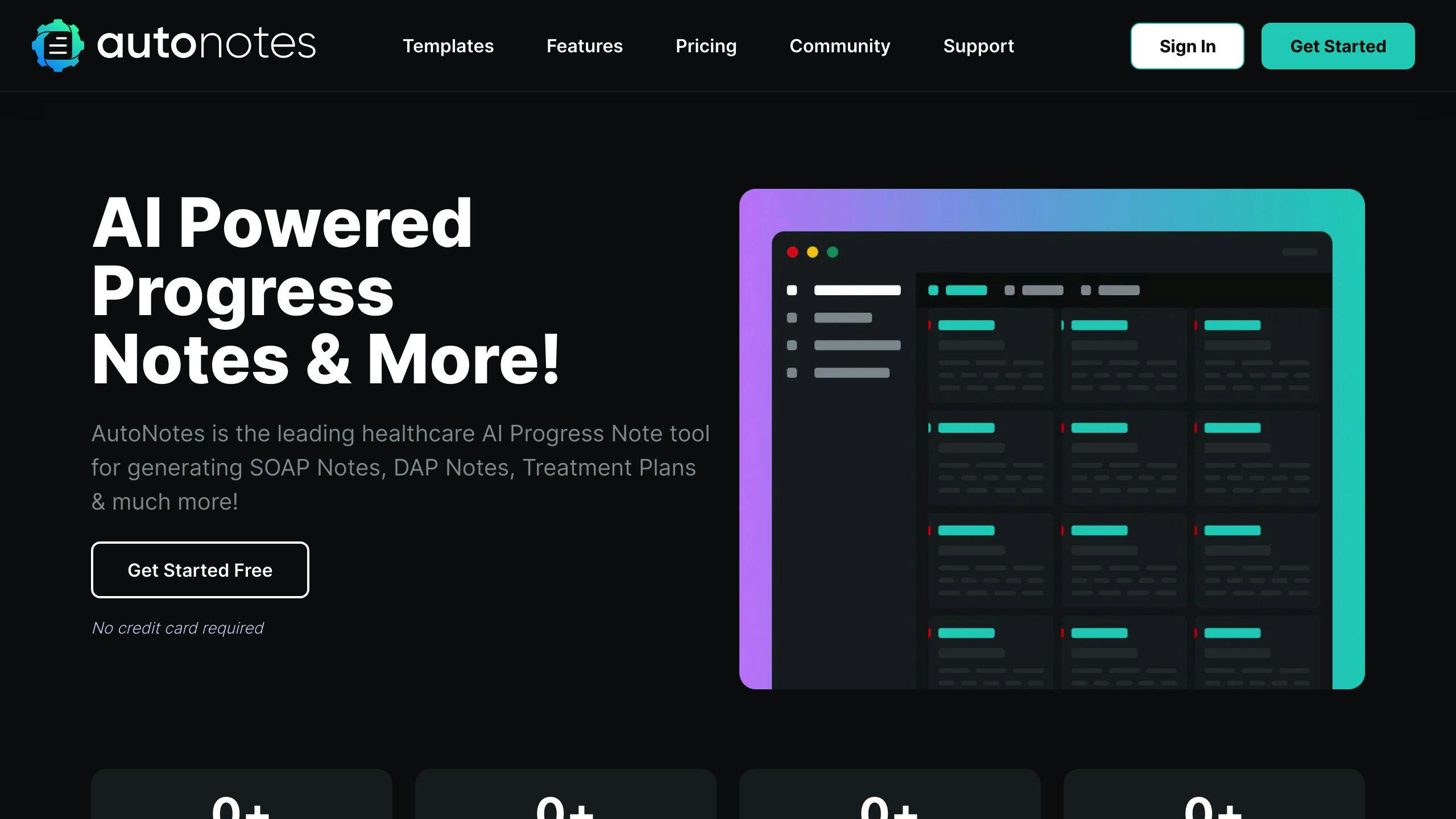
AutoNotes is a customizable AI scribe software that allows therapists to create tailored document templates. Its pricing strategy is competitive, and user reviews highlight the software's ability to improve documentation accuracy and reduce administrative burdens.
Key Features
- Customizable document templates
- Competitive pricing strategy
- User reviews highlight improved documentation accuracy
TheraPro: Secure Therapy Note Software
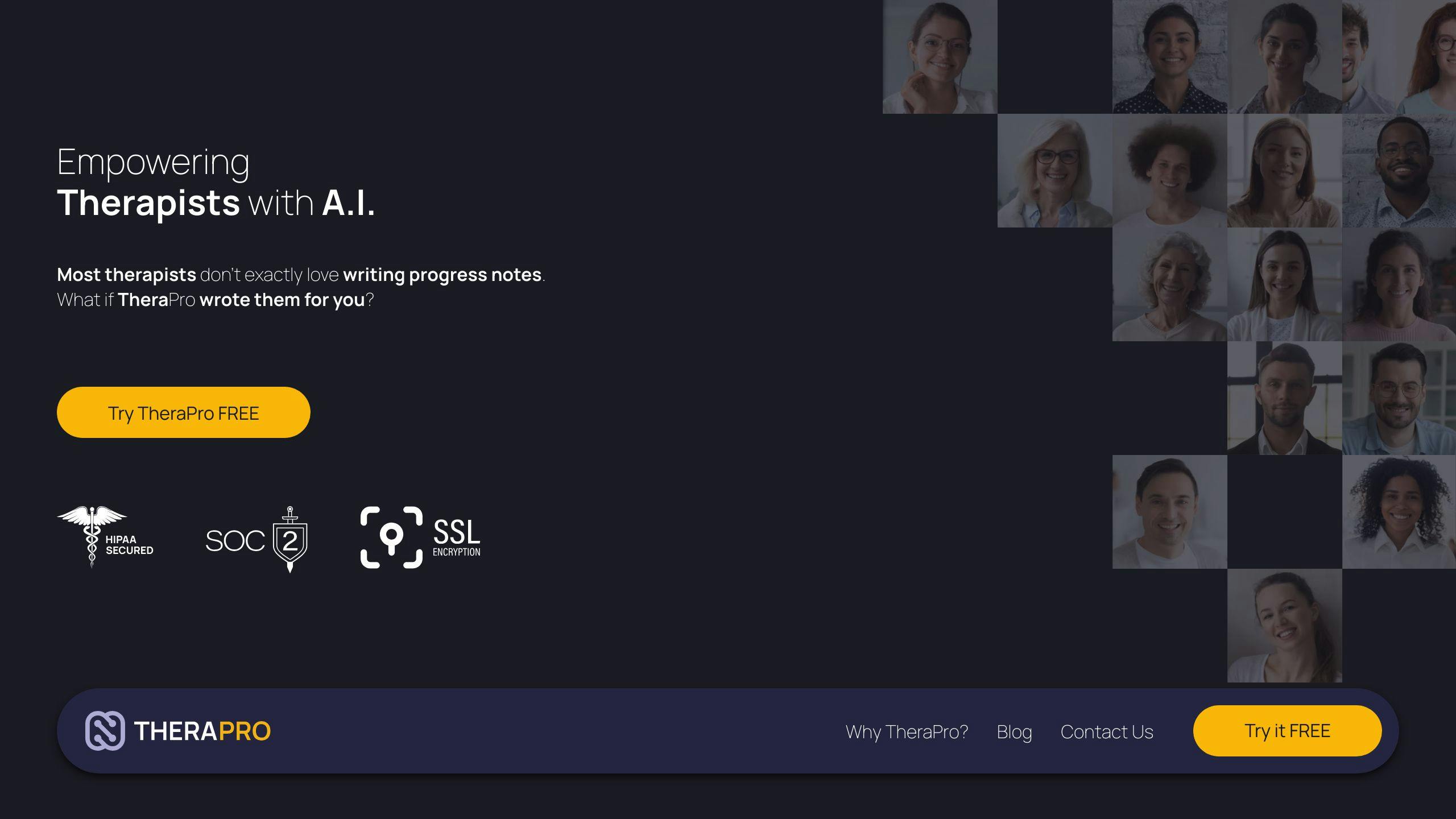
TheraPro is a secure AI scribe software that summarizes sessions into progress notes with high accuracy. Its data security protocols ensure the confidentiality and security of patient data.
Key Features
- Secure therapy note software
- High accuracy in note-taking
- Flexible pricing plans
Orchid AI: EHR-Integrated Note Generator
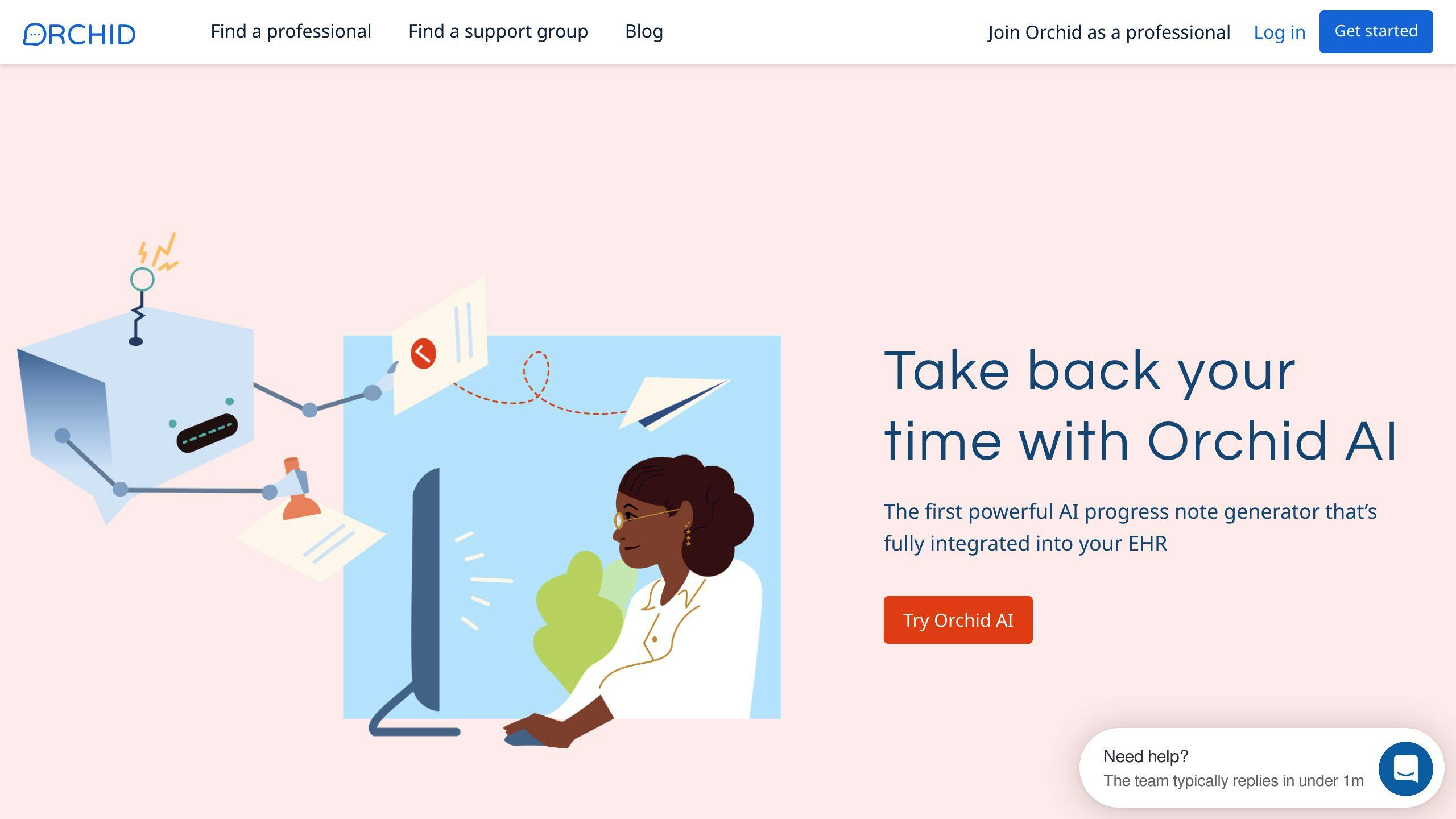
Orchid AI is an EHR-integrated AI software that generates progress notes with high accuracy and efficiency. Its security features ensure the confidentiality and security of patient data.
Key Features
- EHR-integrated note generator
- High accuracy and efficiency
- Security features for patient data
These top AI scribe software solutions in 2024 offer a range of features, security measures, and user experiences that cater to the unique needs of behavioral health professionals. By automating note-taking tasks, these solutions enable clinicians to focus on patient care, improving overall quality and efficiency.
sbb-itb-527d68c
Implementing AI Scribe Software
Implementing AI scribe software into your behavioral health practice can significantly improve the quality and efficiency of patient care. However, it requires careful planning, consideration, and execution to ensure a seamless integration. In this section, we'll explore the key strategies and considerations for implementing AI scribe software.
Choosing the Right AI Scribe Software
When evaluating AI scribe software, consider the following factors:
| Factor | Description |
|---|---|
| Compatibility | Ensure the software integrates with your existing EHR system and workflow. |
| Accuracy | Look for software with high accuracy rates in note-taking and documentation. |
| Customization | Choose software that allows for customizable templates and workflows to meet your practice's specific needs. |
| Security | Ensure the software complies with HIPAA regulations and has robust security measures in place to protect patient data. |
Staff Training and Adoption
To ensure a smooth transition:
- Provide comprehensive training: Offer training sessions for clinicians and staff on using the AI scribe software, focusing on its features and best practices.
- Encourage feedback: Foster an open feedback culture, allowing staff to share their experiences and suggestions for improving the implementation process.
- Gradual rollout: Implement the AI scribe software in phases, starting with a small group of clinicians or departments, to minimize disruptions and refine the process before scaling up.
Adapting to New Documentation Processes
To adapt successfully:
- Develop new workflows: Establish clear workflows and protocols for using the AI scribe software, ensuring that clinicians and staff understand their roles and responsibilities.
- Monitor and adjust: Continuously monitor the implementation process, identifying areas for improvement and making adjustments as needed.
- Communicate with patients: Inform patients about the new documentation process, addressing any concerns or questions they may have.
By following these strategies and considerations, you can ensure a successful implementation of AI scribe software in your behavioral health practice, ultimately improving the quality and efficiency of patient care.
Ensuring Privacy and Compliance
When using AI scribe software in behavioral health settings, it's crucial to maintain patient confidentiality and adhere to HIPAA guidelines. This section outlines the essential measures to ensure privacy and compliance.
Protecting Patient Data
To safeguard patient data, healthcare providers must:
- Encrypt data: Protect data both in transit and at rest
- Implement access controls: Use multi-factor authentication and role-based access
- Conduct regular security audits: Identify and address potential risks
- Train staff: Educate staff on HIPAA regulations and data security best practices
Transparency and Consent
Healthcare providers must:
- Obtain patient consent: Get explicit consent from patients before using AI scribe software
- Explain data use: Clearly explain how patient data will be used and protected
- Provide access to medical records: Allow patients to access their records and request corrections or deletions
Choosing HIPAA-Compliant AI Scribe Software
When selecting an AI scribe software, healthcare providers must:
| Criteria | Description |
|---|---|
| Robust security measures | Verify that the software has implemented robust security measures to protect patient data |
| Business associate agreement (BAA) | Ensure the software provider has a BAA in place |
| HIPAA compliance | Conduct due diligence on the software provider's security practices and compliance with HIPAA regulations |
By following these guidelines, healthcare providers can ensure they maintain patient confidentiality, adhere to HIPAA guidelines, and implement secure data practices while leveraging AI scribe technology to improve documentation processes.
The Future of AI Documentation
The future of AI documentation in behavioral health is promising. As AI technology advances, we can expect significant improvements in AI scribe software, leading to better efficiency, accuracy, and patient care.
Advancements in AI Technology
AI scribe software will become more accurate and comprehensive, enabling healthcare providers to focus on patient care. Natural language processing (NLP) and machine learning algorithms will play a key role in enhancing the accuracy of AI-generated notes.
Integration with Electronic Health Records (EHRs)
AI scribe software will integrate seamlessly with EHRs and other healthcare systems, reducing errors and improving patient care.
Specialization in Behavioral Health
AI scribe software will cater to specific needs and requirements of different behavioral health specialties, such as psychiatry, psychology, and social work.
Ensuring Security and Privacy
AI scribe software providers will implement robust security measures to protect sensitive patient information.
The Future of AI Documentation
The future of AI documentation in behavioral health is bright. AI scribe software will revolutionize the way healthcare providers document patient interactions, freeing up time for more critical tasks and improving patient outcomes.
Key Takeaways
- AI scribe software will become more accurate and comprehensive
- Integration with EHRs and other healthcare systems will reduce errors and improve patient care
- AI scribe software will cater to specific needs and requirements of different behavioral health specialties
- Robust security measures will protect sensitive patient information
- AI documentation will improve patient outcomes and free up time for more critical tasks
FAQs
Can AI write therapy notes?
Yes, AI can write therapy notes. AI-powered scribe software can automatically generate notes based on audio recordings of therapy sessions. These notes can be reviewed and edited by therapists to ensure accuracy and completeness. AI-generated notes can save time and reduce the administrative burden on therapists, allowing them to focus on patient care.
How does AI write mental health progress notes?
AI uses natural language processing (NLP) technology to analyze audio recordings of therapy sessions and generate written notes. This technology identifies key phrases, sentiments, and themes in the conversation and creates a concise and accurate summary of the session. The AI can also be trained to recognize specific mental health conditions, symptoms, and treatment plans, ensuring that the generated notes are relevant and informative.


